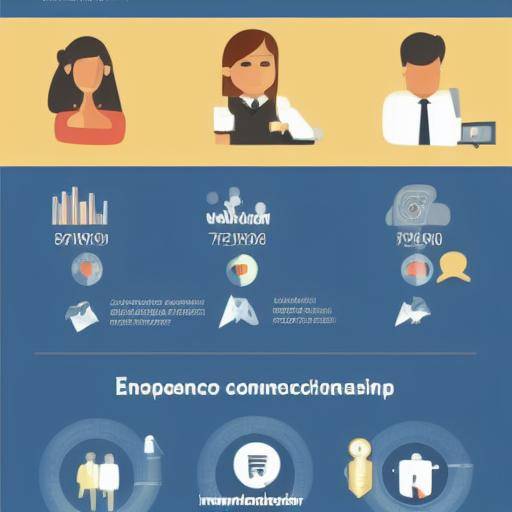
Communication is an essential skill in personal and professional life. Within the broad spectrum of communication, active listening plays a key role in the development of social intelligence. In this article, we will explore in depth the impact and importance of active listening on social intelligence, as well as its influence on effective communication.
Introduction
Active listening is a crucial component of effective communication. This ability goes beyond simply hearing what the interlocutor is saying. It implies giving full and committed attention to what is being communicated, both verbally and not verbally. Social intelligence, on the other hand, refers to the ability to understand and manage one's own and other emotions, as well as the ability to establish and maintain effective relationships. Both concepts are closely related, and understanding their dynamics can have a significant impact on the way we communicate and relate to others.
History and Background
To understand the importance of active listening in social intelligence, it is essential to explore its origins and evolution over time. Active listening has been part of human interactions since time immemorial. In ancient civilizations, oral transmission of stories and knowledge required not only linguistic skills, but also the ability to listen carefully. Over the centuries, the perspective on the importance of active listening has evolved, and its impact on the development of social intelligence has gained greater relevance.
Social intelligence has also experienced significant change throughout history, especially in the context of psychology and sociology. From the first theories on emotional intelligence and social intelligence proposed by scholars such as Daniel Goleman and Howard Gardner, to contemporary advances in neuroscience and theories of human behavior, the concept of social intelligence has become increasingly important in various fields, including psychology, education and personal development.
Analysis in Deep
To better understand the dynamics between active listening and social intelligence, it is essential to analyze in detail the benefits and challenges that both skills involve. Active listening not only creates an environment of trust and respect in interactions, but also promotes empathy and mutual understanding, essential aspects of social intelligence. Likewise, the ability to understand the emotions and thoughts of others, a central feature of social intelligence, is enhanced through active listening.
As we move forward in our analysis, it is important to emphasize that both active listening and social intelligence can present challenges in their practical application. Overload of information, constant distractions and the accelerated pace of modern life are just some of the obstacles that can hinder active listening practice. In the case of social intelligence, managing one's own emotions and understanding non-verbal signals can represent significant challenges for many people.
Comprehensive review
In exploring the practical applications of active listening and social intelligence, it is crucial to identify concrete examples that illustrate their impact in different contexts. In working environments, the ability to actively listen to colleagues and clients is critical to success in problem solving, decision-making and building strong professional relationships. Similarly, in the field of education, empathy and emotional understanding play a crucial role in the academic and personal development of students.
At this point, it is essential to focus on best practices associated with active listening and social intelligence. Experts in communication and psychology have developed specific techniques and strategies that can significantly improve the ability to listen actively, as well as loose understanding and management of emotions in social and professional contexts. These strategies range from the practice of full attention to the development of skills to interpret and respond to the non-verbal signs of others.
Comparative analysis
By comparing active listening, social intelligence and communication, it is clear that these three dimensions are deeply interconnected. Effective communication is largely based on the ability to listen actively, understand the emotions and perspectives of others, and convey messages clearly and persuasively. The interrelationship between these skills highlights the importance of addressing communication from a holistic perspective that values both listening and conscious expression.
Practical Tips and Accessible Recommendations
For those interested in developing their active listening skills and strengthening their social intelligence, there are numerous practical strategies and recommendations that can be implemented in everyday life. Some of these include the regular practice of active listening in daily conversations, the development of empathy through the exercise of getting into the place of the other, and the cultivation of emotional awareness through personal reflection and the observation of social interactions.
Industry Perspectives and Expert Reviews
The importance of active listening, social intelligence and effective communication in different professional fields has been widely recognized by experts and practitioners from various fields. Featured figures in areas such as psychology, corporate leadership and personal development have shared their views on the relevance of these skills in contemporary environments. Their contributions, often supported by pragmatic research and experiences, offer a valuable insight into the implications and advantages of applying these skills in labor and social contexts.
Case Studies and Real Life Applications
Case studies that illustrate the practical application of active listening and social intelligence in real situations provide a detailed overview of the tangible benefits that these skills offer. In examining examples of labour interactions, family dynamics or educational experiences, it is revealed how effective implementation of active listening and social intelligence can influence the development of sound relationships, conflict resolution and informed decision-making.
Future Trends and Predictions
As we move towards a future marked by the growing digital interconnection and the evolution of labour and social environments, it is crucial to consider emerging trends related to active listening, social intelligence and effective communication. The integration of innovative technologies, the emphasis on cultural diversity and globalization are likely to continue to shape how listening skills and social understanding are valued and applied in society. Anticipating and preparing for these trends can be fundamental for those who seek to develop and strengthen their interpersonal skills.
Conclusions and FAQs (FAQs)
Active listening, social intelligence and effective communication play interconnected and fundamental roles in the way we relate and unfold in the world. Their influence extends to personal, professional and social fields, and their understanding and practice can significantly impact the quality of our interactions and our success in various spheres of life.
FAQs
1. What is the difference between active listening and simply listening?
The fundamental difference lies in the level of commitment and attention that involves active listening. While the simple listening action involves hearing the interlocutor's words, active listening goes beyond requiring full and committed attention, as well as a deep understanding of what is being communicated.
2. How can I improve my ability to listen actively in the workplace?
Some effective strategies include the establishment of an appropriate visual contact with the interlocutor, the elimination of distractions, the formulation of open questions to encourage interaction, and the practice of active empathy by reacting to the emotions and needs expressed by others.
3. Can social intelligence develop or is it an innate trait?
While some people may show a natural inclination towards social intelligence, this ability can be developed and strengthened over time through conscious practice, personal reflection and continuous learning about social and emotional dynamics.
4. What impact does active listening have on conflict resolution?
Active listening plays a crucial role in conflict resolution by allowing a deeper understanding of the concerns and perspectives of all parties involved. It facilitates effective communication, the establishment of empathy and the search for collaborative solutions.
5. What are some ways to apply social intelligence in a working environment?
In a working environment, social intelligence can be applied through effective team management, interpersonal problem solving, negotiation of beneficial agreements and fostering an inclusive and collaborative working environment.
6. How can effective communication enhance social intelligence in an educational context?
Effective communication in the educational field can strengthen social intelligence by fostering mutual understanding, developing active listening skills between students and teachers, and promoting a learning environment in which individual emotions and experiences are valued and respected.
Conclusion
In short, the practice of active listening and the development of social intelligence are essential elements for effective communication and healthy interpersonal relationships. Its influence extends to all areas of life, from the working environment to family and social interactions. By consciously understanding and applying these aspects, we can improve the quality of our relationships, enhance our leadership skills and contribute more significantly to our environment. The integration of active listening and social intelligence into our daily interactions not only allows more effective communication, but also enriches our lives by fostering understanding, empathy and collaboration.
Ultimately, the impact of active listening on social intelligence is profound and transcendental. By actively practicing these skills and understanding their importance in our daily lives, we can cultivate more authentic and meaningful relationships as well as contribute positively to the emotional and social well-being of ourselves and those around us.






















































